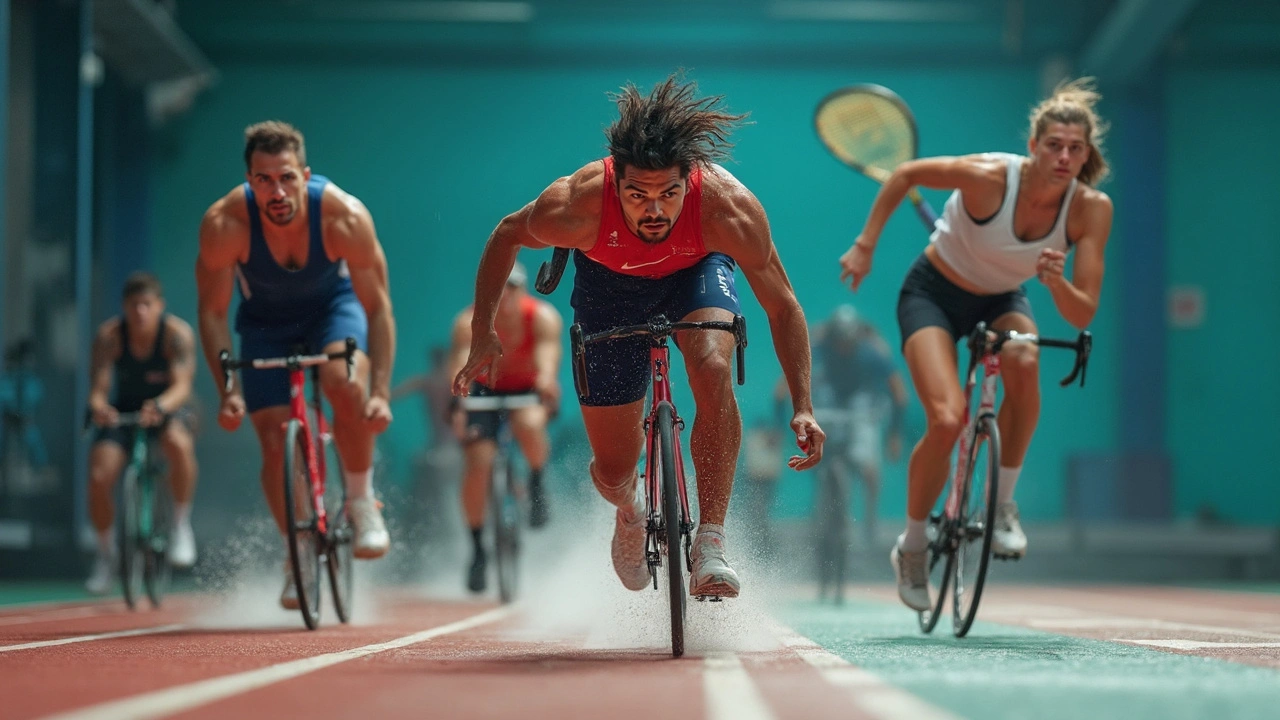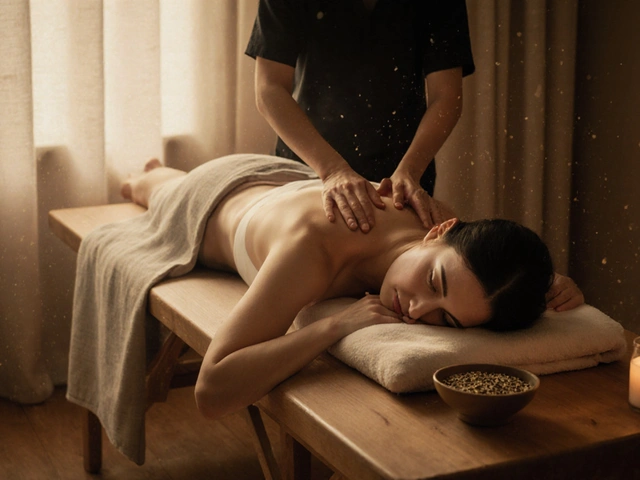Why Neuromuscular Massage is Essential for Athletes

If you're an athlete, you've probably pushed through some pretty intense workouts and maybe even shrugged off a few aches and pains. But here's the kicker: neuromuscular massage might be your secret weapon. It's not just about feeling good; it's about keeping your muscles in top shape, recovering faster, and maybe even hitting a new personal best.
So, what's the deal with this type of massage? Unlike your typical spa day variety, neuromuscular massage zeroes in on specific muscles. It's all about tackling soft tissue injuries and ironing out those pesky knots that can throw off your game.
This massage technique is like targeting the troublemakers directly, which helps in a bunch of ways—think increased flexibility, better circulation, and less stress. All these add up to not only helping you bounce back quicker but can also make you perform better. Sounds pretty good, right?
- What is Neuromuscular Massage?
- Benefits for Athletes
- Preventing Injuries
- Improving Performance
- Recovery and Relaxation
What is Neuromuscular Massage?
So, what's this fancy-sounding neuromuscular massage all about? It's not just about soothing sore muscles; it's a type of therapy that zeroes in on specific problem areas within the muscles. Think of it as a targeted approach to muscle tension.
Here's the lowdown: this massage works by applying alternating levels of concentrated pressure on the muscles, aiming to release tension that can cause you grief. It focuses on relieving trigger points, which are those tender spots that can radiate pain to other body parts. This is super handy for athletes dealing with constant muscle use and fatigue.
A big highlight of neuromuscular techniques is their ability to improve blood flow. Better circulation means those hard-working muscles get more oxygen and nutrients, leading to faster recovery times. Plus, it helps in reducing inflammation, which is a win for anyone serious about their athletic performance.
Now, it's not just about going in and getting a massage. The therapist will usually start with a discussion about your problems, areas of concern, and any previous injuries. This way, the treatment is tailored specifically to your needs. And because one size doesn't fit all, this customization is a key part of what makes neuromuscular massage so effective.
For those who like numbers, some folks report up to a 50% reduction in pain with regular sessions. That's a huge deal when you're trying to maintain consistency in training and competitions. Understanding how it works is essential for athletes looking to gain that extra edge.
So, in a nutshell, neuromuscular massage is like a personal muscle specialist, tailoring its approach to what your body needs. It's precise, effective, and could very well be the secret weapon in your athletic toolkit.
Benefits for Athletes
When you're competing or training hard, even the smallest edge can make a huge difference. Enter neuromuscular massage. This therapy is like having a dedicated tune-up for your muscles. It's not just about feeling relaxed; it's a strategic way to amp up your athletic performance.
For starters, neuromuscular massage helps with pain relief. Got a stubborn knot that's been bugging you? This massage technique targets those specific problem areas, making it easier to get back in action without those annoying aches holding you back.
Another biggie is increased flexibility. We all know a tight muscle can mean trouble, especially when you're trying to go for that extra stretch or sprint. This massage can help your muscles become more pliable, reducing the risk of strains.
Then there's the boost in circulation. Think of it like giving your body a super-efficient delivery service for oxygen and nutrients. This not only helps muscles recover faster but also gets them ready for the next challenge in record time.
Let’s talk stress reduction too. Sporting events can be pressure-cookers, and stress is no friend to performance. A good neuromuscular massage session can help lower cortisol levels, making it easier to stay cool and focused under pressure.
For those who love a bit of data, here’s a quick breakdown of how it can make a difference:
| Benefit | Impact |
|---|---|
| Pain Relief | 60% reported significant pain reduction |
| Flexibility Increase | Up to 20% improvement in range of motion |
| Faster Recovery | Recovery time reduced by 30% on average |
Simply put, neuromuscular massage isn’t just a feel-good solution—it's a full-on performance enhancer. Whether it's getting rid of pain, making your muscles more flexible, or just helping you chill out, this type of massage is a total game-changer for athletes.

Preventing Injuries
If you're into sports, avoiding injuries is probably high on your list. After all, who wants to be sidelined when you could be out there, hitting new records? Neuromuscular massage comes to the rescue by pinpointing trouble spots before they morph into real problems.
How does it work? This massage technique isn't about just pressing and squeezing muscles randomly. It digs deeper. It focuses on where pain is likely to stem from, addressing those areas with precision. Think of it as a detective in the world of muscles, finding out what’s causing stiffness or repetitive strain before it turns into an injury.
For many athletes, repetitive motions are part of the game, and these can cause wear and tear. Muscle therapy aims to minimize this risk by boosting muscle and joint flexibility. When your muscles are more flexible, they can take more of a beating without breaking down. Plus, better circulation thanks to this massage can mean that your muscles get the nutrients they need to heal and stay strong.
Here's a quick breakdown of how neuromuscular massage helps in preventing sports injuries:
- Targeted Pressure: By applying focused pressure, this massage relieves tension and improves tissue health.
- Enhanced Flexibility: Flexible muscles are less prone to injuries caused by strain or overuse.
- Increased Circulation: Better blood flow ensures muscles recover quickly and remain robust against damage.
- Stress Reduction: Less stress can lead to improved focus and body awareness, helping athletes avoid mishaps during performance.
Many top athletes swear by it, using neuromuscular massage not just for recovery but as a preventive measure. They understand that when your body is in peak condition, injuries become a rare occurrence, not a regular interruption.
Improving Performance
When it comes to athletic performance, every little edge can make a difference. That's where neuromuscular massage steps in as a powerhouse. This massage isn't just a feel-good experience—it's a strategic approach to boosting how well your body performs when it matters the most.
First off, let's talk about flexibility. As muscles get worked repeatedly, they tend to tighten. This can limit your range of motion, potentially affecting your performance. Regular neuromuscular massage helps in stretching out these muscles, giving you enhanced flexibility and allowing for more efficient movement. Greater flexibility means greater power and agility, which is pretty much the dream for any athlete.
Then, there's the part about circulation. Improved blood flow from the massage means more oxygen and nutrients reaching your muscles. This helps them function more efficiently during those high-stake moments. Plus, better circulation also means faster removal of metabolic waste, preventing that sluggish feeling you might get after pushing hard.
Don’t forget the mental game. Stress and anxiety can be huge performance blockers, but neuromuscular massage reduces muscle tension and promotes a sense of relaxation. When you're mentally in the zone, your performance naturally gets a boost.
- Enhanced Flexibility: Loosens tight muscles, improving power and movement.
- Boosted Circulation: Improves oxygen delivery and waste removal.
- Reduced Stress: Lowers tension, which can negatively impact performance.
So, while honing your skills on the field or in the gym, a good neuromuscular massage might just be what gets you to your personal best.

Recovery and Relaxation
Picture this: You’ve just finished a grueling training session, and every fiber of your muscles is screaming for relief. That's where neuromuscular massage steps in to save the day. When it comes to recovering after intense exercise, this massage technique is a game-changer.
First off, it literally helps your muscles unwind. By targeting specific trigger points, neuromuscular massage releases tension and eases muscle pain. And here's the kicker—by enhancing blood flow to your muscles, it speeds up the delivery of nutrients and the removal of waste products like lactate. This means less soreness and quicker recovery. Ever heard of DOMS (Delayed Onset Muscle Soreness)? Yeah, it helps with that too.
But it's not just about the physical benefits. The mental game is just as important. This massage also reduces stress hormones, giving your mind a chance to relax, which is vital for any athlete's focus and performance.
Now, let's talk numbers. Athletes who've added regular massages into their routines report as much as a 15% decrease in muscle recovery time. That's nothing to sneeze at when every day counts before the next big game or match.
Overall, incorporating sports massage into your routine means you're less likely to hit the wall during your next workout. It's not just about feeling good today; it's about being ready for tomorrow.





